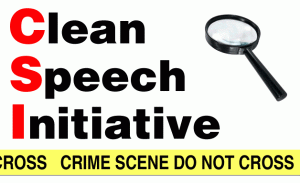In Defense of Clean Speech in Christian Fiction, Part 8
 See Part 1, Part 2, Part 3, Part 4, Part 5, Part 6, and Part 7.
See Part 1, Part 2, Part 3, Part 4, Part 5, Part 6, and Part 7.
Secondary Considerations: How Can We Know Whether Certain Words Are Vulgar or Profane?
When I began this series, I mentioned participating in an online discussion about whether certain . . . ahem . . . words were ever okay to use in Christian fiction. One problem that hijacked the debate was the inability (or unwillingness) on the part of some to agree on the vulgarity of certain words. “Well, that word doesn’t seem vulgar to me,” they said.
First, those in the discussion were all from the United States. Unless some of us grew up Amish, that we couldn’t reach some level of agreement doesn’t seem credible. Second, refusing to agree seems like a clever way to shift the debate. If the debate becomes about the vulgarity of certain words instead of about what God has said, then one need never engage biblical truths. That appears to be one strategy to continue a debate that should have been over long ago. Third, this seems to be a position swimming in relativism—as if no one can possibly know.
I believe the debate is over and has been for some time, but let’s keep a few ground rules in mind.
First, as I pointed out in an earlier post, relativism does come into play in rare cases, depending on time and culture. (Remember my discussion of the words bloody and gay?) But right now, right here in America, relativism, as I will show, doesn’t apply to this discussion.
Second, the Bible doesn’t give us a list of good and bad words. For many areas of life, God has given us principles rather than outright decrees. It’s like He trusts us to be smart enough to apply what His Word says to the world around us. So let’s be trustworthy and discerning.
Third, we also need to show kindness to those who are still growing in their understanding—and admit we have room to grow too. Also understand that some simply don’t want to be persuaded.
So you think a word is crude, your friend doesn’t. How can we settle the matter? Here are some truths and resources to consider.
Content Rating Systems
Remember my story about the high school senior who lost her diploma for cussing during her commencement speech? Even society recognizes that certain expressions are offensive to certain audiences. We see this in the recording industry’s assigning “advisories” to the lyrics of certain songs. We see it in ratings assigned to TV shows and in the motion picture industry’s deciding whether a movie is rated PG-13 or R—often solely based on what certain words in our culture mean. Consider this TV MA description:
This program is specifically designed to be viewed by adults and therefore may be unsuitable for children under 17. This program may contain one or more of the following: crude indecent language (L), explicit sexual activity (S), or graphic violence (V). (http://www.tvguidelines.org/ratings.htm, my emphasis)
Did you notice? Even those who rate TV shows recognize language that is “crude” and “indecent.” There appears to be no debate as to which words fall into these categories. The debate appears to linger only among certain Christian novelists.
A helpful ratings resource from a Christian worldview is Pluggedin.com, a media-review website from Focus on the Family. This site offers detailed reviews of popular movies and music. The “Crude or Profane Language” category is particularly helpful to our discussion. Want to know if a certain movie has coarse language? Pluggedin will tell you not only which words are used but how many times they appear. When I considered letting my daughters watch the movie Hugo on Netflix (by the way, they really liked it), I went here first.
A Good Dictionary
Merriam-Webster’s Collegiate Dictionary is the standard for book editors across the country (I know because editing books is my day job). Wonder if a certain term is vulgar or profane? Here’s a simple exercise. Go to http://www.merriam-webster.com. Type in the word and see what the dictionary says. Do you see anything like “sometimes vulgar,” or “usually vulgar,” or “often obscene”? If so, then you know the word is in the “Crude or Profane Language” category.
Keep in mind that Merriam-Webster’s Collegiate Dictionary is not our standard for living—the Bible is. However, this dictionary is probably the most revered and trusted authority on the written and spoken word in our culture today. Don’t fall for the argument of relativism. We can know what words mean.
Your Pastor
Here’s one more option—more like a dare really. Compose a single sentence and sprinkle in several controversial words. On Sunday after the worship service, ask your pastor if you can read something to him. Read the sentence you composed (if you have the nerve). Note his reaction. 🙂
The notion that we cannot know which words are vulgar or profane is a straw man intended to shift the debate. I think all of us know, but some have chosen not to admit it.
Beyond simple cultural common sense, I argue that we are not without helpful resources when making vocabulary choices. Each believer will need to sort through these matters for himself or herself and choose. What’s critical is recognizing that God does indeed prohibit corrupt communication for those who bear His name. It’s up to us to decide whether we will obey Him and then apply His truths to the words we use in life and in our writing.
What about you? Are you aware of any other resources that may help us be discerning when making decisions about appropriate word choice?









